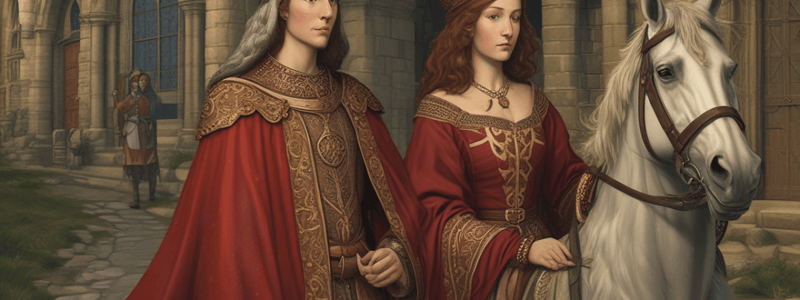Podcast
Questions and Answers
What was the main goal of the Crusades?
What was the main goal of the Crusades?
- To reclaim sacred religious locations from Muslims (correct)
- To spread Christianity across Europe
- To establish a new royal succession line in England
- To prevent the spread of the Black Death in Europe
What was the significance of the Magna Carta in 1215?
What was the significance of the Magna Carta in 1215?
- It led to the rise of a middle class in Europe
- It ensured the king would protect the holdings of land barons from outside invaders (correct)
- It established the royal succession line in England
- It marked the beginning of the Hundred Years' War
Who led soldiers against the English during the Hundred Years' War?
Who led soldiers against the English during the Hundred Years' War?
- Joan of Arc (correct)
- A French king
- A noble English baron
- A leader of the Crusades
What was the impact of the Great Plague on the Middle Ages?
What was the impact of the Great Plague on the Middle Ages?
What was the duration of the Hundred Years' War?
What was the duration of the Hundred Years' War?
What was the primary consequence of the Battle of Hastings in 1066?
What was the primary consequence of the Battle of Hastings in 1066?
What was the main factor that contributed to the spread of the Black Death in Europe?
What was the main factor that contributed to the spread of the Black Death in Europe?
What was the role of nobles in England during the period following the Battle of Hastings?
What was the role of nobles in England during the period following the Battle of Hastings?
What was the outcome of the War of French Succession, also known as the Hundred Years' War?
What was the outcome of the War of French Succession, also known as the Hundred Years' War?
What was the significance of the Great Plague in terms of its impact on the Christian Church's doctrine?
What was the significance of the Great Plague in terms of its impact on the Christian Church's doctrine?
Flashcards are hidden until you start studying
Study Notes
• The Middle Ages, also known as the Dark Ages or Medieval times, spanned from the 5th century to the 15th century and is often misunderstood as a period of intellectual decline, but it was a time of significant strides, including the spread of Christianity, the Crusades, and the Magna Carta.
• The Roman Empire, which had controlled much of Europe, parts of Northern Africa, and the Middle East, experienced growing pains due to its vast landholdings, weakened by infighting and civil wars, and ultimately fell to the Germanic tribes and Visigoths.
• Alaric, a Goth leader, delivered the final blow to the Roman Empire after being denied Roman citizenship and territories in the Balkans by the Roman Emperor Honorius, and marched across the Alps with an army of Goths, Huns, and former Roman slaves.
• The fall of the Roman Empire came in 476 when the 14-year-old heir to the empire was displaced, marking the beginning of the Middle Ages and allowing other groups to gain power and control.
• The Byzantines, who saw themselves as Romans, established an empire centered in Constantinople, but it splintered after Constantine's death, and Charlemagne, a charismatic leader and military strategist, united much of Western Europe through conquest and forced conversion to Christianity.
• Christianity spread throughout Europe, dividing into two philosophies - the Eastern Orthodox Church and the Catholic Church - and became the most powerful entity of its time, influencing all aspects of life.
• The Crusades, which lasted from 1095 to 1291, were a series of wars fought by European knights to reclaim sacred religious locations from Muslims, but ultimately proved ineffective and ended.
• The Battle of Hastings in 1066 established the royal succession line in England and ushered in the Norman Conquest, but subsequent kings were less interested in ruling, leading to a power vacuum filled by nobles.
• The Magna Carta, signed in 1215, ensured the king would protect the holdings of land barons in England from outside invaders and outlined the noblemen's rights and roles, guaranteeing their landholdings and political influence.
• The War of French Succession, also known as The Hundred Years' War, lasted from 1337 to 1453 and involved several countries, including England, and was eventually resolved.
• Joan of Arc, a teenage girl, led soldiers against the English during the Hundred Years' War, but was captured, tried for heresy, witchcraft, and cross-dressing, and burned at the stake in 1431.
• The Great Plague, or Black Death, brought to Europe from Asia and the Near East, spread quickly through unsanitary cities, killing an estimated one-third of the population, and had a profound impact on the Middle Ages, causing people to question the Christian Church's doctrine and become more independent.
• The plague forced changes in politics and religion, leading to the rise of a middle class, and ultimately contributed to the end of the Dark Ages and the beginning of the Renaissance.
Studying That Suits You
Use AI to generate personalized quizzes and flashcards to suit your learning preferences.





